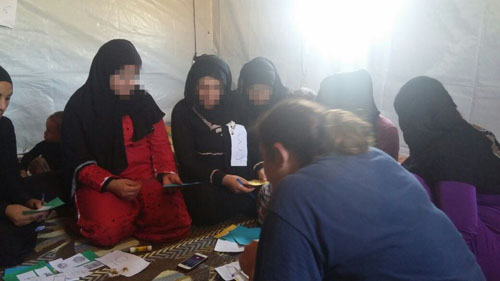Authors: Reem Talhouk
Posted: Thu, August 09, 2018 - 9:47:44
In our July–August 2018 Interactions article, “HCI and Refugees: Experiences and Reflections,” my co-authors and I really wanted to document all the discussions we have been having about what it means to be HCI researchers working intimately with refugee communities. In the article, we aimed to bring forth challenges experienced while conducting fieldwork and how our research is influenced by our own principles as well as the agenda of other stakeholders. We often find that as interesting as these conversations are, they unfortunately don’t make their way into our publications. So what is the value of documenting such reflections? Upon the release of the article I received an email from a fellow Ph.D. student saying that the article made her feel that she is not the only one experiencing challenges in conducting this type of research. That in itself gives value to articles such as this.

Using mock ups with refugees in a settlement in Lebanon
At several instances when working in refugee settlements in Lebanon, I have found myself witnessing great injustices and hardships that have made me question my role and what my research can possibly do to support refugee communities. My co-authors and other researchers have discussed having the same concerns. We found ourselves reflecting on how, more and more, we find ourselves embracing our activist selves and aligning our research with the agenda of refugee communities. However, immersing ourselves in our research so that we can even begin to understand refugee experiences and what the communities we work with expect from us may come at the cost of our own emotional well-being. Indeed, working within such contexts places you face-to-face with individuals and families that are recounting their overwhelming experiences. Such encounters make you as an individual feel helpless and as a researcher feel miniscule, as you realize that there is not much one research project can do. Such feelings are further exacerbated when you are back in the comfort of your own home and you realize that you are living a completely different reality than the communities at the heart of your work. Such reflections take an emotional toll on researchers as they attempt to reconcile their experiences with refugee communities and their own lives. It is because of these emotions, expressed during the Communities & Technologies 2017 workshop, that we dedicated a whole section in the article to researcher health and well-being. As such, we encourage researchers in this field to seek out peers to share their experiences and to reflect on how it is influencing their health and well-being.
As discussed in the article, such reflexive processes should be inherent to our work. What we find is that given the highly political nature of the refugee crisis, the reflexive process brings to the forefront our own political views and values. However, we often found ourselves in meetings attempting to quiet the screams of frustration in our heads as we diplomatically smiled at stakeholders expressing political views we disagree with. Quite frequently we need to engage with such stakeholders to access refugee communities, and this puts us in a precarious positions, where I keep questioning “Where do I draw the line?” “What things that stakeholders say should I shrug off and what things should I argue with?” Unfortunately there is no simple answer. I once had to sit through a meeting in which a gatekeeper talked negatively about refugees throughout and I had to diplomatically navigate the conversation so that I did not oppose him but at the same time not agree with him. I must say, it is very difficult to remain neutral on a topic that is so intimately tied with your beliefs and political views. However, in cases such as this, neutrality is essential when considering the larger objective of my research, which is to support refugee communities through technological innovations.
In the article we highlight the types of conversations we should be having as HCI researchers working in this field. Additionally, we provide guidelines based on our experiences that we hope would benefit other researchers in the field. As a group we are very open to having these conversations and would be more than happy to have chats with others in the field, even if it is just part of their reflective process.
Posted in: on Thu, August 09, 2018 - 9:47:44
Reem Talhouk
View All Reem Talhouk's Posts







Post Comment
No Comments Found